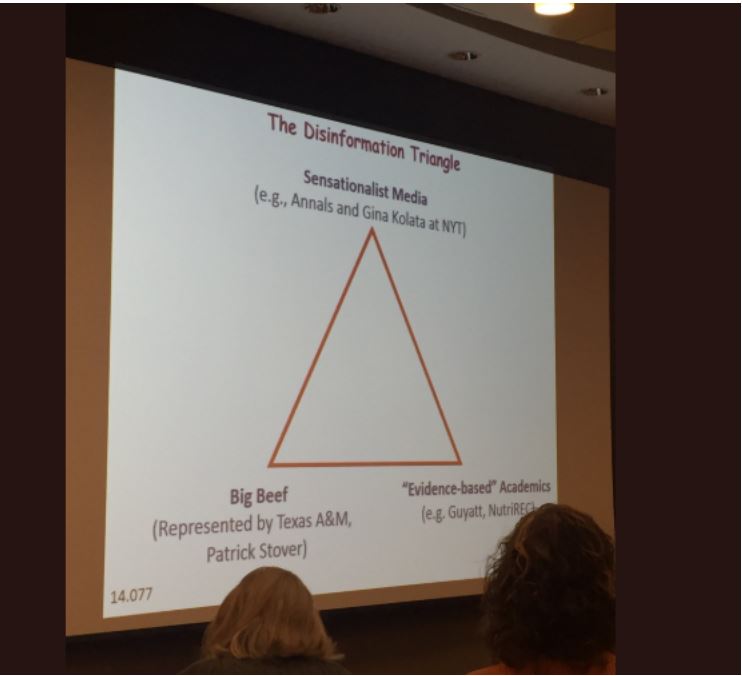Such warmed over 1990s anti-meat posturing is nothing new from epidemiologists and since they are at the same school which just put its closet anti-Semitism on display for all to see, maybe they are hoping that something which remains a safe position for their political tribe - meat is killing us - will recover some of their lost standing among fellow Democrats. Nothing else can explain why they would write something as stupid as that they have correlated meat to type 2 diabetes.
If you are not familiar with epidemiology, you may not be aware it isn't science, it is just an EXPLORATORY result statisticians found by looking at columns of foods and then rows of diseases, and when they found a cluster which they could declare "statistically significant" they write a paper. Such papers happen about 9,000 times per year. If you think sugar-free chewing gum, pickled beets, and aloe vera cause cancer, or that vaping causes anorexia, thank agenda-driven epidemiologists.
This latest Harvard sloppiness is asking people what they remembered eating and then looking at how many eventually got type 2 diabetes. Since so many ate meat *presto* they can declare statistical significance. Even though that is meaningless.
Side note: If you think modern pesticides cause autism while old ones used in 600 percent greater quantities will not, I feel like I should note that you should not for one second believe chewing gum, pickled beets, or aloe vera causes cancer. Epidemiologists can "suggest" it, but that doesn't make it legitimate.
That also goes for "suggesting" meat is causing diabetes. The methodology is so bad I could use it to claim coin flips are bigoted against heads. Or tails. Or that meat prevents cancer.
If you do understand science, and unlike Guardian journalists are smarter than an illiterate 16th century peasant, you know two important things epidemiologists ignore in their media claims: Correlation is not causation and; the dose makes the poison.
That's what Harvard and their hundreds of millions of student loan exploitation and their tens of billions of dollars in an endowment funding get wrong claiming a link between type 2 diabetes and meat; unlike type 1 diabetes, type 2 is a lifestyle disease. It is almost universally caused by eating too much and not exercising. It is commonly controlled by lifestyle changes. Meat is not the problem, calories are.
You can separate out meat in that pile of calories, if you have an agenda, but that is not science. It is not even legitimate epidemiology. It is a financially-motivated grift. And it is a gigantic industry, not just for Harvard School of Public Health and The Guardian but for lots of groups worldwide. True Health Initiative, a militant vegetarian group - yes, it sounds ridiculous - was exposed by a whistleblower account showing how they used automated email campaigns to harass an editor at a journal who published a paper noting that the 'risk' of meat was negligible. Walter Willett and Frank Hu were called out for libeling and slandering anyone who disagreed with their vegetarian agenda.

When epidemiologists attack - anyone who disagrees with their vegetarian agenda. Like Willett, in public here.
Where do Hu and Willett work? You guessed it, the Harvard School of Public Health - and they co-authored this 'meat is killing you' paper.
The good news about epidemiology only being over in the exploratory pile and not medically or scientifically relevant is that if you are worried a vegan diet leads to poor brain function, that correlation is bogus also. Maybe you took up a vegan diet because you don't think very well, but the diet didn't cause it.
NOTE:
(1)

I believe Guardian employees think they are not for sale - because the only bad funding is direct corporate donations. Organic food industry trade groups that send large donations and suddenly have their anti-science loon writing op-eds there? It is no coincidence but editors and the sales team rationalize that they would have published her anyway. What argument do environmental groups and other anti-science activists deny? That any corporate funding to a scientist will be made because they like the work you do and want you to continue to do it.
When it comes to their enemies in science, they insist everything is quid pro quo. Yet not when they get money. The populism against billionaires and the transparency that comes with shareholders is odd to sensible people, but on-brand for Guardian. They want a secret cabal gathering money, they want to offer board seats to those who give the most money, and they don't have to disclose much at all as long as they wrap themselves in the flag of being anti-corporate.





Comments